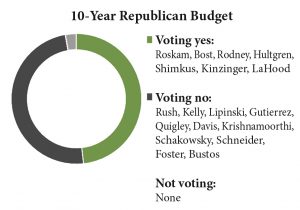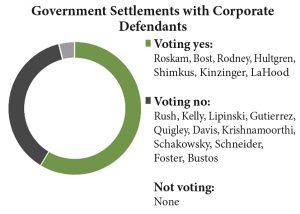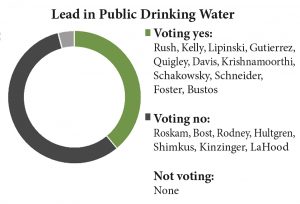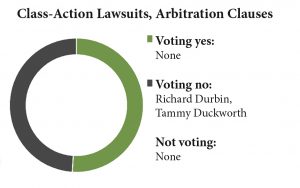Illinois Congressional delegation: How they voted
Chronicle Media — October 31, 2017Report for week ending October 27 , 2017.
UNITED STATES HOUSE OF REPRESENTATIVES
 10-Year Republican Budget: Voting 216 for and 212 against, the House on Oct. 26 gave final congressional approval to a 10-year fiscal blueprint (H Con Res 71) that would set the stage for later action on corporate and individual tax cuts increasing budget deficits by up to $1.5 trillion. The largely non-binding budget plan for fiscal 2018-2027 calls for cutting entitlement and discretionary spending by $5.8 trillion and sets ground rules that would allow the Senate to pass a tax-overhaul bill by a simple-majority vote. The measure also clears the way for opening the Arctic National Wildlife Refuge to oil and gas drilling, ending the deduction for state and local income taxes and lowering contribution limits for 401(k) retirement accounts.
10-Year Republican Budget: Voting 216 for and 212 against, the House on Oct. 26 gave final congressional approval to a 10-year fiscal blueprint (H Con Res 71) that would set the stage for later action on corporate and individual tax cuts increasing budget deficits by up to $1.5 trillion. The largely non-binding budget plan for fiscal 2018-2027 calls for cutting entitlement and discretionary spending by $5.8 trillion and sets ground rules that would allow the Senate to pass a tax-overhaul bill by a simple-majority vote. The measure also clears the way for opening the Arctic National Wildlife Refuge to oil and gas drilling, ending the deduction for state and local income taxes and lowering contribution limits for 401(k) retirement accounts.
Rick Allen, R-Ga., said the GOP’s proposed tax overhaul “lowers taxes at every income level, allowing Americans to keep more of their hard-earned paychecks. It delivers the lowest tax rates in modern history for job creators, allowing them to invest in growing their business.”
Jan Schakowsky, D-Ill., said the GOP budget “paves the way for trillions of dollars in tax cuts for millionaires, billionaires and wealthy corporations. And who would pay for it? It would be the middle-class families, children, seniors and people with disabilities.”
A yes vote was to adopt the GOP budget plan.
 Government Settlements with Corporate Defendants: Voting 238 for and 183 against, the House on Oct. 24 passed a GOP-sponsored bill (HR 732) that would prevent the Justice Department from entering into or enforcing settlement agreements that require corporate defendants in civil actions brought by the government to donate to third parties in addition to paying fines and making restitution to direct victims of their alleged misconduct. Backers said such donations circumvent congressional authority to direct the use of federal funds and can be politicized to direct money to favored groups. Opponents of the bill said such settlements provide essential relief to parties who have suffered collateral damage because of the defendant’s actions.
Government Settlements with Corporate Defendants: Voting 238 for and 183 against, the House on Oct. 24 passed a GOP-sponsored bill (HR 732) that would prevent the Justice Department from entering into or enforcing settlement agreements that require corporate defendants in civil actions brought by the government to donate to third parties in addition to paying fines and making restitution to direct victims of their alleged misconduct. Backers said such donations circumvent congressional authority to direct the use of federal funds and can be politicized to direct money to favored groups. Opponents of the bill said such settlements provide essential relief to parties who have suffered collateral damage because of the defendant’s actions.
In one settlement cited in debate, Bank of America and Citigroup agreed to fund foreclosure-prevention programs when they settled litigation based on their involvement in the 2007-2009 financial and housing crisis. In another, BP agreed to make payments to groups including the National Academy of Sciences and the National Fish and Wildlife Foundation in a settlement related to the 2010 Deepwater Horizon explosion and oil spill in the Gulf of Mexico.
Bob Goodlatte, R-Va., said: “In its final two years, the Obama Department of Justice directed nearly $1 billion to third parties entirely outside of Congress’ spending and oversight authority. All along, (it) strained to deny the obvious problem — that mandatory donation provisions create opportunities to play favorites.”
David Cicilline, D-R.I., said: “There are many examples where generalized harm is impossible to calculate or impractical to quantify in the courts. Without this ability by the Justice Department to enter into these settlement agreements, corporate wrongdoers are going to be free to do whatever they want.”
A yes vote was to send the bill to the Senate.
 Lead in Public Drinking Water: Voting 191 for and 229 against, the House on Oct. 24 refused to exempt from HR 732 (above) settlements with corporate defendants alleged to have increased the amount of lead in public drinking water. Under the Democratic-sponsored amendment, such settlements could be used, in part, to remedy the indirect harm inflicted by leaded drinking water on public health and infrastructure in certain communities. Debate focused on the lead contamination of drinking water in Flint, Mich., in recent years.
Lead in Public Drinking Water: Voting 191 for and 229 against, the House on Oct. 24 refused to exempt from HR 732 (above) settlements with corporate defendants alleged to have increased the amount of lead in public drinking water. Under the Democratic-sponsored amendment, such settlements could be used, in part, to remedy the indirect harm inflicted by leaded drinking water on public health and infrastructure in certain communities. Debate focused on the lead contamination of drinking water in Flint, Mich., in recent years.
Sponsor John Conyers, D-Mich., said his amendment should be adopted because “lead contamination in public drinking water is potentially a national public-health crisis as older cities continue to rely on aging lead pipes for the delivery” of their water.
Mike Johnson, R-La., said Congress appropriated $120 million to address Flint’s drinking-water problems, adding that the Department of Justice “should not be permitted to augment those funding decisions entirely outside of the congressional appropriations and oversight processes.”
A yes vote was to adopt the amendment.
UNITED STATES SENATE
 Class-Action Lawsuits, Arbitration Clauses: Voting 51 for and 50 against, with Vice President Pence casting the deciding vote, the Senate on Oct. 24 approved nullification of a Consumer Financial Protection Bureau rule that would expand the ability of customers to sue financial institutions. Set to take effect in March, the rule sought to allow aggrieved individuals to band together in class-action lawsuits against credit card issuers, banks, payday lenders and other retail financial firms. Consumers entering into contracts with financial firms are now often required to agree to use mandatory arbitration to resolve disputes, thus signing away the option of pursuing claims in court. Mandatory arbitration is conducted by company-approved mediators under rules that limit discovery, bar disclosure of the outcome and prohibit meaningful appeals.
Class-Action Lawsuits, Arbitration Clauses: Voting 51 for and 50 against, with Vice President Pence casting the deciding vote, the Senate on Oct. 24 approved nullification of a Consumer Financial Protection Bureau rule that would expand the ability of customers to sue financial institutions. Set to take effect in March, the rule sought to allow aggrieved individuals to band together in class-action lawsuits against credit card issuers, banks, payday lenders and other retail financial firms. Consumers entering into contracts with financial firms are now often required to agree to use mandatory arbitration to resolve disputes, thus signing away the option of pursuing claims in court. Mandatory arbitration is conducted by company-approved mediators under rules that limit discovery, bar disclosure of the outcome and prohibit meaningful appeals.
John Cornyn, R-Texas, said: “The reason the Consumer Financial Protection Bureau wants to ban arbitration as a means of alternative dispute resolution is that the trial lawyers, who benefit from the huge attorneys’ fees awards, do not like the idea that they are, basically, being boxed out of that dispute resolution system….”
Sherrod Brown, D-Ohio, said: “Looks like Equifax and Wall Street and Wells Fargo will win again. The vice president only shows up in this body when the rich and the powerful need him. It is pretty clear tonight that Wall Street needs him. This vote will make the rich richer. It will make the powerful more powerful.”
A yes vote was to send the nullification measure (HJ Res 111) to President Trump.



